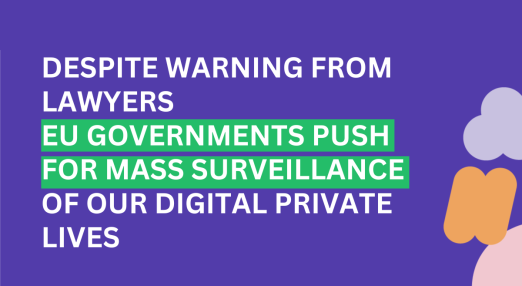Our work
EDRi is the biggest European network defending rights and freedoms online. We work to to challenge private and state actors who abuse their power to control or manipulate the public. We do so by advocating for robust and enforced laws, informing and mobilising people, promoting a healthy and accountable technology market, and building a movement of organisations and individuals committed to digital rights and freedoms in a connected world.
Filter resources
-

Open letter: Hundreds of scientists warn against EU’s proposed CSA Regulation
Over 300 security researchers & academics warn against the measures in the EU's proposed Child Sexual Abuse Regulation (CSAR), citing harmful side-effects of large-scale scanning of online communications which would have a chilling effect on society and negatively affect democracies. The letter remains open for signatures.
Read more
-

Despite warning from lawyers, EU governments push for mass surveillance of our digital private lives
Whilst several EU governments are increasingly alert to why encryption is so important, the Council is split between those that are committed to upholding privacy and digital security in Europe, and those that aren’t. The latest draft Council text does not go anywhere near far enough to make scanning obligations targeted, despite clear warnings from their own lawyers.
Read more
-

EDRi is trialling the four-day working week
Starting from 1 July, the EDRi office in Brussels will begin a trial of working time reduction until the end of the year. The pilot foresees that all full-time staff members will work 32 hours over four days per week (Monday to Thursday) while maintaining salaries at the same level. The pilot will run from July to the end of December, followed by an evaluation to explore a shift to the 4-day week.
Read more
-

Press Release: The EU’s Internal Market Committee votes for protecting encryption in the CSA Regulation
The European Union’s Internal Market and Consumer Protection (IMCO) Committee becomes the fourth European Parliament Committee to adopt an opinion on the European Union Child Sexual Abuse (CSA) Regulation, voting to protect encryption and rule out unacceptably risky technologies.
Read more
-

Spotify gets fine of € 5 Million for GDPR violations
Following an EDRi member noyb complaint and litigation over inactivity, the Swedish Data Protection Authoirty (IMY) has issued a fine of 58 Mln Swedish Crown (about € 5 Million) against Spotify.
Read more
-

Guarding health data privacy in Europe: The limits and challenges of current regulations
The GDPR demonstrates the capacity of the European Union to prioritise data protection and privacy. The collection and use of health data by private corporations makes privacy protections critically important. Taken together, the provided policy recommendations here create comprehensive steps forward.
Read more
-

Encryption protects our rights, privacy is not a crime
End-to-end encryption is currently under attack by prosecutors and legislators in France, the EU, the UK and the US. We are asked to choose, as a society: do we accept a future in which our private mail and communication can be intercepted anytime, in which we are treated as potential suspects?
Read more
-

Development of EU border police watchlist is “progressing well”
The development of a new watchlist for “identifying connections” between people seeking authorisation to travel to the EU and terrorist or criminal suspects is “progressing well”, according to a Europol report obtained by EDRi member Statewatch.
Read more
-

Warnings from the UK: 24/7 racialised GPS surveillance
Campaigners assembled outside Capita PLC’s Annual General Meeting in the City of London on Thursday 11 May are contesting the outsourcing company’s £114m contract to deliver 24/7 GPS monitoring services, used by the Home Office to surveil people without British citizenship.
Read more
-

EDRi-gram, 28 June 2023
Recent developments in crucial digital European Union regulations have raised many eyebrows as we see attempts to undermine human rights. 27 civil society organisations, including EDRi, stood against the use of people's sensitive information to target them with political messages online. 65 civil society and journalist associations also urged the Council of the European Union to ensure stronger safeguards to protect journalists in the European Media Freedom Act. In this edition, you can also read about how digital rights are a civic space issue and why privacy is not a crime.
Read more
-

Digital rights for civil society and civil society for digital rights: how surveillance technologies shrink civic spaces
Digital technology has transformed civic spaces - online and offline. In our digital societies, characterised by injustice and power imbalances, technology contributes to shrinking civic spaces. And to defend civic spaces against surveillance, we need strong and resourced civil society organisations and movements.
Read more
-

Civil liberties MEPs warn against undermining or circumventing encryption in CSAR
MEPs from the European Parliament’s Civil Liberties committee have thrown down the gauntlet with their amendments to one of the EU’s most controversial proposals: the Child Sexual Abuse Regulation (CSAR). These amendments show a clear majority for fully protecting the integrity of encryption. Content warning: contains discussions of child sexual abuse and child sexual abuse material
Read more
